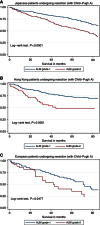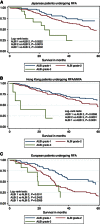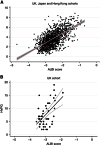Long-term impact of liver function on curative therapy for hepatocellular carcinoma: application of the ALBI grade
- PMID: 27022825
- PMCID: PMC4984858
- DOI: 10.1038/bjc.2016.33
Long-term impact of liver function on curative therapy for hepatocellular carcinoma: application of the ALBI grade
Abstract
Background: Application of curative therapy for hepatocellular carcinoma is crucially dependent on underlying liver function. Using the recently described ALBI grade we examined the long-term impact of liver dysfunction on survival of early-stage hepatocellular carcinoma (HCC) patients.
Methods: This cohort study comprised 2559 HCC patients from different geographic regions, all treated with curative intent. We also examined the relation between indocyanine green (ICG) clearance and ALBI score. Survival was measured from the date of treatment to the date of death or last follow-up.
Results: The ALBI score correlated well with ICG clearance. Among those undergoing surgical resection, patients with ALBI grade-1 (good liver function) survived approximately twice as long as those with ALBI grade-2 (less good liver function), although more than 90% of these patients were classified as Child-Pugh (C-P) grade A. In the cohort receiving ablative therapies, there was a similar difference in survival between ALBI grade-1 and grade-2. Cox regression analysis confirmed that the ALBI score along with age, gender, aetiology and tumour factors (AFP, tumour size/number and vascular invasion) independently influenced survival in HCC patients receiving curative treatments.
Conclusions: The ALBI score represents a simple approach to the assessment of liver function in patients with HCC. After potentially curative therapy, those with ALBI grade-1 survived approximately twice as long as those with ALBI grade-2. These data suggest that ALBI grade-1 patients are appropriately treated with surgical resection whereas ALBI grade-2 patients may, where the option exists, be more suitable for liver transplantation or the less invasive curative ablative therapies.
Figures




Comment in
-
Reply to: Comment on: 'Long-term impact of liver function on curative therapy for hepatocellular carcinoma: application of the ALBI grade'.Br J Cancer. 2016 Aug 23;115(5):e6. doi: 10.1038/bjc.2016.197. Epub 2016 Jun 23. Br J Cancer. 2016. PMID: 27336606 Free PMC article. No abstract available.
-
Comment on: 'Long-term impact of liver function on curative therapy for hepatocellular carcinoma: application of the ALBI grade'.Br J Cancer. 2016 Aug 23;115(5):e5. doi: 10.1038/bjc.2016.196. Epub 2016 Jun 23. Br J Cancer. 2016. PMID: 27336607 Free PMC article. No abstract available.
References
-
- Berzigotti A, Reig M, Abraldes JG, Bosch J, Bruix J (2015) Portal hypertension and the outcome of surgery for hepatocellular carcinoma in compensated cirrhosis: a systematic review and meta analysis. Hepatology 61: 526–536. - PubMed
-
- Bosch J, Abraldes JG, Berzigotti A, García-Pagan JC (2009) The clinical use of HVPG measurements in chronic liver disease. Nat Rev Gastroenterol Hepatol 6: 573–582. - PubMed
-
- Bruix J, Castells A, Bosch J, Feu F, Fuster J, Garcia-Pagan JC, Visa J, Bru C, Rodes J (1996) Surgical resection of hepatocellular carcinoma in cirrhotic patients: prognostic value of preoperative portal pressure. Gastroenterology 111: 1018–1022. - PubMed
-
- Bruix J, Sherman M (2005) Management of hepatocellular carcinoma. Hepatology 42: 1208–1236. - PubMed
-
- European Association For The Study Of The Liver-European Organisation For Research And Treatment Of Cancer (2012) EASL-EORTC clinical practice guidelines: management of hepatocellular carcinoma. J Hepatol 56: 908–943. - PubMed
MeSH terms
LinkOut - more resources
Full Text Sources
Other Literature Sources
Medical
Molecular Biology Databases
Miscellaneous

